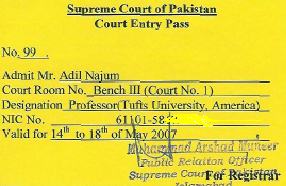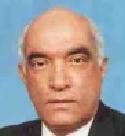Adil Najam
 I have commented before (here, here and here) that recent events in Pakistan, especially the dynamics unleashed by popular movement in support of the Chief Justice of Pakistan, have deeper significance than just the future of Justice Iftikhar Chaudhry ; or for that matter merely the future of Gen. Musharraf’s government – with uniform or without.
I have commented before (here, here and here) that recent events in Pakistan, especially the dynamics unleashed by popular movement in support of the Chief Justice of Pakistan, have deeper significance than just the future of Justice Iftikhar Chaudhry ; or for that matter merely the future of Gen. Musharraf’s government – with uniform or without.
One – I believe immense – significance is that everyone now understands and talks about the importance of institutions and institutional sanctity. This is no small thing in itself. Another – I believe equally immense – significance is that it marks a return of ‘politics’ in the best sense of the term (read Hussain Haqqani on why politics is good and why it is important). Political decisions ought to be political. Too many people have denied that reality for to long. But, now people are demanding political solutions. That can only be good.
What we have also seen – and this is related to the first point above – is a new assertiveness by the judiciary.
Whatever you might think of the motivations of Chief Justice Chaudhry or of the merits of the accusations against him, the fact is that his actions – and even more importantly the actions of the lawyer community – have sent forth a signal that power can be defied, even if it is not denied. That one can say ‘no.’ In particular, the judiciary has seemingly found solace and well as courage to assert their institutional responsibilities far more deliberately than has been the case in most of Pakistan’s history. Even if they are not inclined to do so themselves, the media has made sure that they will do so out of the knowledge that each statement will be scrutinized and made transparent.
The result is a rather refreshing assertiveness from the judiciary which I had witnessed first hand during my recent visits to the Supreme Court(see ATP Eyewitness report); even though it is only now that I am beginning to grasp the full motivations and implications of this change. This, it seems, has been another important collateral benefit of the entire CJ episode; at least for the time being.
Two important news items – both very important in their own rights – are, I believe, evidence of this same assertiveness. If this is, in fact, a trend that is to be continued that it is to be welcomed.
 The first is the statement from Chief Election Commissioner (CEC) Justice (Retd) Qazi Mohammad Farooq saying that it is improper for the President to be addressing political public meetings. Accoridng to Daily Times (July 1):
The first is the statement from Chief Election Commissioner (CEC) Justice (Retd) Qazi Mohammad Farooq saying that it is improper for the President to be addressing political public meetings. Accoridng to Daily Times (July 1):
Chief Election Commissioner Justice (r) Qazi Muhammad Farooq on Saturday expressed displeasure with President Pervez Musharraf’s speeches to public meetings. Talking to reporters at his office here, the CEC said that it was not appropriate for the man holding the country’s top office to address public meetings.
Speculation is already rife about what this means about the ‘loyalty’ of the CEC or whether the CEC will ‘walk the talk’ and government ministers are demonstrating their displeasure. Speculations cannot, of course, be avoided. But the real importance is that the Chief Election Commissioner has found an assertiveness that his predecessors have not always shown. Partly because he realizes that he can (and should) be assertive. And partly because he realizes that his silence would itself be conspicuous and be put under scrutiny.
 Even more speculation has been triggered by the very vocal displeasure shown by the Supreme Court over ‘scandalous’ documents filed by government lawyers in the CJ case. The judges are clearly displeased by the interference of intelligence agencies in the case and have shown this displeasure in the most unambiguous terms. One wonders, of course, what was in these documents and also what this says – if anything – about the direction of the judges’ thinking. But the more important point is that they have lashed out against the interference of intelligence agencies in these judicial matters like no one ever does in Pakistan. According to The News (July 3):
Even more speculation has been triggered by the very vocal displeasure shown by the Supreme Court over ‘scandalous’ documents filed by government lawyers in the CJ case. The judges are clearly displeased by the interference of intelligence agencies in the case and have shown this displeasure in the most unambiguous terms. One wonders, of course, what was in these documents and also what this says – if anything – about the direction of the judges’ thinking. But the more important point is that they have lashed out against the interference of intelligence agencies in these judicial matters like no one ever does in Pakistan. According to The News (July 3):
A 13-member full court, hearing the petition of the chief justice against the presidential reference, on Monday banned intelligence agencies’ personnel from entering the superior courts of the country. Notices were issued to the law secretary, and Advocate on Record (AOR) Ch Akhtar Ali for submitting scandalous documents. The court commanded that no unauthorised person including officials of the intelligence agencies of whichever department of the state would enter the offices of the apex court or of the high courts and that no one would seek access to any record of this court and the high courts.
The bench ordered the registrar of the Supreme Court and the registrars of the respective high courts to ensure compliance of this order. The bench ruled that the concerned registrar would be personally responsible and liable for any deviation or non-compliance of this order. The full court also ordered the director general of the Intelligence Bureau to inspect the premises of the apex court and residences of the judges regarding presence of any bugging instruments or devices and submit a personal affidavit about their non-existence within one week.
The court also imposed Rs 100,000 fine on the Federation as costs for having filed a vexatious and scandalous application and said this amount would be sent for the benefit of the flood victims of Balochistan.
The government tendered apology and withdrew the said documents that according to the full court were ‘designed to scandalise this court and to malign some of the honourable judges of this court.’ Counsel for the Federation Malik Qayyum said he could not read the documents as they were filed urgently. “You want to malign everybody…we will take action against those who have prepared these documents,â€? said Justice Khalil-ur-Rehman Ramday. “You took a risk to please your client and you have to face the consequences,â€? Justice Ramday further observed.
I really like that they instructed that the fine be sent to the victims of the Balochistan floods, but the real story here is the message they are sending to meddling intelligence agencies. Anyone who follos Pakistan politics woudl appreciate that this is bigger than any message this incident sends about their intent about how the case will be decided. Again, the bigger story here is that the judges are showing an assertiveness – and an assertiveness against intelligence mavens – that Pakistan has been mostly unfamiliar with.
If one listens carefully, one finds that the judges are being assertiveness not only against the government ministers but are equally assertive against the plaintiff’s lawyers. That, if true, is what is really important. Independence does not mean ‘anti-government.’ It means independence.
This assertiveness is itself a collateral benefit of the political roller coaster we are going through. If it lasts it will push forth the institutional reform we have all been talking about. If that happens, that will be bigger than any particular decision that this court or this Chief Election Commissioner may or may not make. I, for one, will continue following the attitudes of the judiciary towards the integrity of their own institution as closely as I follow the specific decisions they make.




















































Hello
I am an indian, and am encouraged the Supreme court is being assertive. This is not only good for Pakistan, but good for India and the whole region.
If the institutions are independent the political leaders and the citizens will not tolerate terrorism. This will help India. Eventually both our countries will reach stability and trust against the other. This will help to normalize the troubled relationship between our countries.
Won’t this help our countries and our region to prosper.
Good luck in your struggle
Suri
I hope this new assertiveness will last. The CJP has given hope and courage to other judges too and if they all take their own institution seriously then that will change the course of Pakistan’s history.
As always, a very good quality post.
I have always held that the judiciary alone can not be faulted for legitimizing military take overs when the people did not rise against the coup makers. The Tamizuddin case is probably one exceptional case where the judiciary had the power and failed in its duty. In other instances, there was nothing that the judiciary could have done and the judges who tried to show some spine were booted out without an iota of protest from the general public and civil society. The present assertiveness owes itself to those heros who have been taking out protest rallies and the media which (before being made to tone down) gave detailed ball-ball coverage and analysis.
Thanks for brining this important issue. When I heard this news today, I was so glad to see the strengthening of judiciary. I think it is going to be a historic turn for our judiciary in the coming days as it would be free from the shackles of ‘invisible power’. For judiciary its a matter of ‘Now or Never’, personally I have that vibe (or over optimism) its NOW (Insha Allah).
Good post Adil! For me the SC decision on the presidential reference came today when the paperwork filed by government’s AoR was thrown out. Justice Qayyum (federation’s lawyer) stated that these docs formed the basis of the presidential reference.
Since matter is subjudice I will not state the obvious. For me the only question now is that how will Musharraf take the verdict.